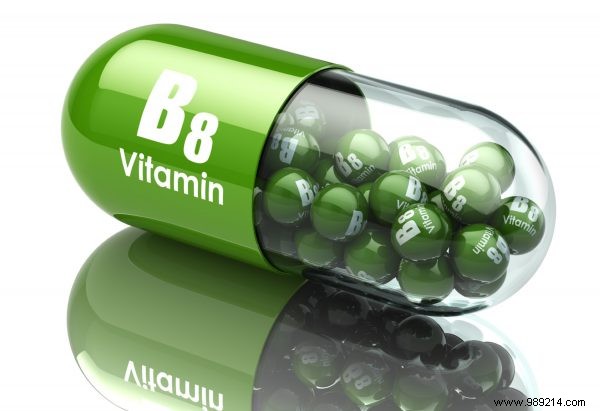
One of the most important vitamins is the vitamin B complex. One of the vitamins from this B complex is vitamin B8, which we also know as biotin. What is Biotin? What functions does it have? What are the complaints about a deficiency and how do you ensure that you get enough of it? These are the answers.
Vitamins are substances that we need for various bodily processes, but which we cannot produce ourselves. Vitamin deficiency can cause problems with physical or mental functioning, cause illness and in extreme cases, vitamin deficiency can even lead to death.
Biotin is essential for our body. It is therefore wise to strive to get enough of it every day. Some vitamins are soluble in fats, others dissolve in water. Vitamin B8 is a vitamin that dissolves in water.
Biotin plays an important role in digestion. It ensures that our body can get enough energy-rich components from our food. The vitamin is involved in the production of fatty acids, substances that every cell of our body needs. It has a proven role in hair growth and ensures that the skin remains healthy, supple and elastic. Biotin is also crucial to our nervous system, from our brains and spinal cords to the nerve endings in our fingers and toes.
A biotin deficiency gives rise to unpleasant complaints. When you are deficient in biotin, the quality of your hair deteriorates visibly. Your hair loses bounce, becomes brittle and shows less of their natural shine. You can also get skin problems, which in the worst case turn into skin disorders. Due to its many functions, biotin has an important role in the construction and production of new cells. If you have a lack of biotin, you will notice this especially in those cells that are renewed the most:red blood cells. Anemia is therefore also one of the more serious consequences of biotin deficiency. You can also get inflammation on your tongue, a tired feeling or you suffer from muscle pain more quickly.
The chance of biotin deficiency is actually very small. In principle, you get enough biotin per day with a normal diet. Some vitamins have a minimum and a maximum dose. Too little causes defects, but too much also causes complaints. Biotin does not belong to this group. It is not a problem if you have more vitamin B8 in your food than your body strictly needs. You can easily dispose of a surplus via your urine.
However, it is possible to develop a deficiency of vitamin B8 even with normal diet. This really only applies to people who have made a habit of eating raw eggs. Raw eggs contain a substance that counteracts the action of biotin. This substance, avidin, binds to vitamin B8, so that your body can no longer absorb it. You may have enough biotin in your food, but because of the action of avidin, your body has no choice but to eliminate it through the stool. If you just eat healthy and not too many raw eggs, you won't be bothered by that.
– This article is a partner contribution of Body-supplies.nl –